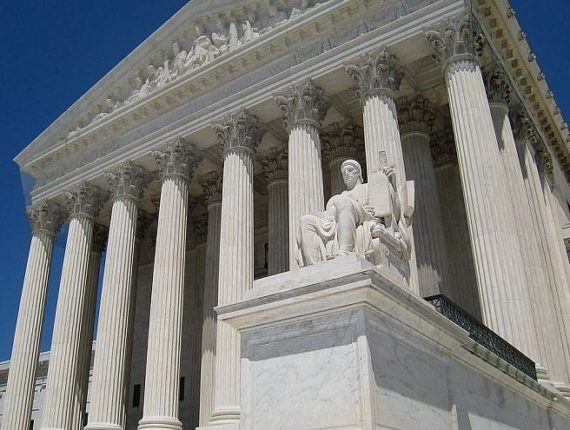
Jewish News Syndicate
June 26, 2018
In a 5-4 vote that fell along political lines, the Supreme Court upheld the president’s ban on travel from several mostly Muslim nations.

The Supreme Court of the United States. Credit: Wikimedia Commons.
(June 26, 2018 / JNS) American Jewish groups expressed mixed reactions to the Supreme Court ruling over U.S. President Donald Trump’s travel ban.
In a 5-4 vote that fell along the court’s political lines, the Supreme Court upheld Trump’s ban on travel from several mostly Muslim nations.
Chief Justice John Roberts said it was not up to the court to weigh in on Trump’s controversial remarks calling for a ban on Muslims, but instead to decide whether or not he had the executive power to issue such bans.
“The issue before us is not whether to denounce the statements,” the chief justice wrote. “It is instead the significance of those statements in reviewing a presidential directive, neutral on its face, addressing a matter within the core of executive responsibility.”
Roberts added that “we must consider not only the statements of a particular president, but also the authority of the presidency itself.”
Several Jewish groups, including HIAS, the Anti-Defamation League and American Jewish Committee had joined amicus briefs against the travel ban, while the Zionist Organization of America supported it.
“The six Muslim majority countries affected by the Proclamation are marked by combat zones, and infested with terrorist groups and sympathizers,” ZOA president Morton Klein said in a statement last April when issuing the amicus brief. “The Proclamation’s vital purpose exemplifies our most fundamental, overriding value of protecting American lives.”
Last January, the Foundation for Ethnic Understanding commissioned a survey, conducted by PSB Research, that found majorities of both Jews and Muslims opposed Trump’s travel ban. Sixty-six percent of Muslims oppose the ban and 52 percent of Jews oppose the ban.
The Coalition for Jewish Values, a rabbinic public-policy organization, welcomed the decision, saying that the travel ban upheld by the Supreme Court “focuses upon countries that harbor both terrorism and hatred for America, and which lack procedures necessary to identify and exclude possible threats. The president’s policy is not merely legal, but correct and praiseworthy.”
Other Jewish groups strongly condemned the ruling, with some calling it a “strain” on American history, comparing it to past controversial Supreme Court rulings.
American Jewish Committee General Counsel Marc D. Stern said: “In making this ruling under an unusually relaxed standard of review, the Supreme Court has chosen to lend its prestige to presidential action motivated by sheer religious animus. The ban is repugnant to bedrock American values of religious equality and openness to immigrants from around the world.”
“Today’s decision will be recalled as a dark and shameful stain on America’s history reminiscent of other times when America turned against our highest ideals of equality, liberty and justice. The president’s Muslim ban is plainly discriminatory, inhumane and un-American, and betrays the president’s oath to uphold the Constitution,” Jonathan Greenblatt, ADL CEO and national director, said in a statement.
Greenblatt added that the decision “echoes of when the United States discriminated against Chinese immigrants, when the Supreme Court allowed our nation to incarcerate more than 100,000 American citizens and others of Japanese descent in the 1940s under the Korematsu decision, and when the United States turned away Jews fleeing the Nazis aboard the SS St. Louis.”
Similarly, the progressive Jewish group Bend the Arc said that the decision would be “remembered in history alongside Dred Scott, Korematsu and other cases where the highest court in the land failed to deliver justice.”
Copyright © 2025 Foundation For Ethnic Understanding. All rights reserved. | Privacy Policy